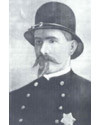American Pastimes features the true but fabled tale of “Duncan & Brady.” In October 1890 Patrolman James Brady was shot and killed while responding to a barroom brawl at the Charles Starkes Saloon in the red-light district of St. Louis, Missouri. Harry Duncan, a boot-black, porter and actor/singer, was arrested and convicted of the crime. The killing escalated racial tensions within the city and violence erupted. Sentenced to hang, Duncan fought the decision with a series of appeals that took the case all the way to the United States Supreme Court. His attorney, Walter Moran Farmer presented his case before the Court. It was the first time that an African-American attorney argued a case before the Supreme Court. The appeal was denied and Duncan was executed by hanging in July 1894. Up until the end Duncan continued to claim that saloon owner Starkes was the real killer.
Probably within weeks of the shooting local musicians were singing about the news event and the evolution of a folk tale began. It doesn’t seem unreasonable to assume that initial versions of the song placed the story in the context of ongoing police harassment of African-Americans in a southern city. But as the song found its way to different communities and musicians it took on new features, specifics, and meaning. With each rendition Duncan’s occupation shifted; from bartender to gambler to grocery owner to lineman. For the most part Brady always remained a police officer (with the “shinin’ star”) and in its most popular widespread versions the song remained a simple matter of good riddance to a corrupt cop. This is evident in the versions collected in the south by Dorothy Scarborough for her 1925 book "On the Trail of Negro Folk-Songs" and those gathered up in Nebraska by Carl Sandburg for his 1927 book "American Songbag:"
Duncan and his
brother was playin’ pool
When in comes Brady actin’ the fool.
Sandburg’s version ends by asking:
Brady, Brady where
you at?
Struttin’ in hell with his Stetson hat.
Even though there is no historical evidence that suggests that the real Patrolman Brady was crooked, in most versions he remains the unsympathetic character. His bad nature is often reinforced by the response of other secondary characters to his death. Music collector Paul Clayton recorded this verse:
Brady, Brady, was a
big fat man;
The doctor caught a hold of Sheriff Brady's hand,
Felt for the pulse and then he said,
I believe to my soul Sheriff Brady is dead.
Been on the job too long.
Even Mrs. Brady’s reaction is presented with ambivalence while at the same time presenting her as a sympathetic character. When told of her husband’s death in some versions:
She up and started
singing his mourning song.
Runnin’ round town, and crying up and down
In an old Mother Hubbard and a blue night-gown
SHE’D been on the job too long.
In yet another version Mrs. Brady takes the news of the shooting with tepid calmness and remarks to their children, "We’ll all draw a pension when your daddy dies," and it’s only the prostitutes who react with real emotion to his demise:
Shufflin' up the
street
In they sweet little shimmies
And they black-stockin' feet.
Been OFF the job too long.
Brady's premature retirement at the
hands of Duncan
provides the Mrs. with a pension, and allows the working girls to return to their livelihood. Everyone wins in this rendition, except of course Brady.
There are quite literally hundreds of recorded versions of this story. As accurate recollections of a historic event they fail. But as reflections of the human experience and lessons in the social conditions found throughout America in the late 19th and early 20th century they more than succeed.
American Pastimes features
versions performed by Tom Rush, Wilmer Watts and the Lonely Eagles, Martin Simpson, and the New Riders of the Purple Sage.
Sources: John Russell David's Ph.D. dissertation "Tragedy in Ragtime: Black Folktales from St. Louis" (St. Louis University, 1976); the Mudcat Cafe folk music website (mudcat.org).












